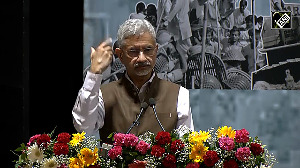Leading Indian nuclear scientists have alleged that the United States has denied India full co-operation in civilian nuclear energy, as promised in agreements between President George W Bush and Prime Minister Manmohan Singh.
The scientists, who met the chairman of the Atomic Energy Commission, also said that India has been asked to participate in the international efforts on nuclear non-proliferation, with a policy that is congruent to that of the US.
They said the deal would have an impact on India's strategic defence programme.
Citing the US' unwillingness to cooperate in the areas of spent-fuel reprocessing & uranium enrichment and the denial of the nuclear fuel supply assurances mutually agreed upon earlier, the scientists said, 'India will not be permitted to join as a technology developer but only as a recipient state.'
In a letter signed by former chairmen of the AEC Dr H N Sethna, Dr M R Srinivasan, Dr P K Iyengar and other leading scientists like ,further said: 'The Hyde Act (Section-109) envisages India to jointly participate with the US in a program involving the US National Nuclear Security Administration to further nuclear non-proliferation goals. This goes much beyond the IAEA norms and has been unilaterally introduced apparently without the knowledge of the Indian government.'
'In addition,' the scientists said, 'the US President is required to annually report to the Congress whether India is fully and actively participating in US and international efforts to dissuade, isolate and if necessary sanction and contain Iran for its pursuit of indigenous efforts to develop nuclear capabilities.'
They said that these stipulations in the Act are totally outside the scope of the July 18 Agreement.
Regarding the adverse impact the Act will have on India's Strategic Defence Program, the scientists cited the prime minister's assurance that nuclear weapons are an integral part of national security and will remain so. They said that the Act negates the above assurance.
According to the act, they said, 'Any future nuclear test will automatically result in a heavy economic loss to the country because of the inability to continue the operation of all such imported reactors.'
Unfortunately, the scientists concluded, 'The Act is totally silent on the US working with India to move towards universal nuclear disarmament, but it eloquently covers all aspects of non-proliferation controls of US priority, into which they want to draw India into committing.'
Former chairman of the Atomic Energy Regulatory Board, Dr A Gopalakrishnan, said: "The Act totally negates all the assurances given by the PM to both houses of the Indian Parliament. The Parliament must insist on a government commitment that any agreement that the government wants to discuss with the US administration shall ensure that it will comply with the assurances of the PM."
Dr A N Prasad, former director of the Bhabha Atomic Research Centre, DR Y S R Prasad, former chairman & managing director of the Nuclear Power Corporation and Dr Placid Rodriguez, former director, Indira Gandhi Center for Atomic Research also attended the meeting.





